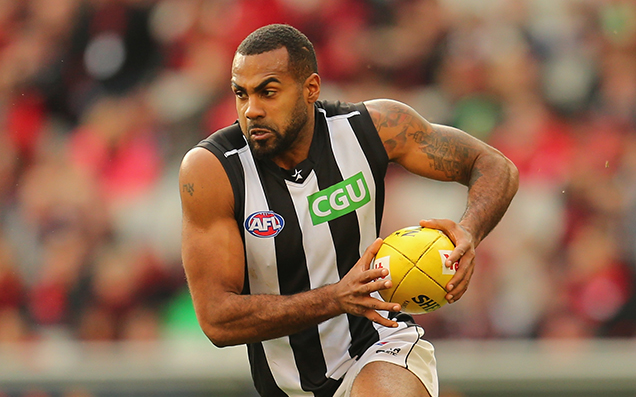
Former AFL star Heritier Lumumba is still fighting for acknowledgment of his own experiences with racism in top-tier footy. And now not only are the AFL and the Collingwood Football Club copping extreme heat for their treatment of Lumumba’s story, but The Project is also drawing ire for a dismissive segment covering it.
Lumumba, a Premiership player and All Australian, retired from AFL footy in 2016 following a string of concussion-related symptoms. However it was treatment he received internally during his 10-year stint at Collingwood that is again at the forefront of the ongoing discussion regarding racism in sport.
In 2013 Lumumba, then an active Magpies player, addressed his teammates regarding a culture of racist jokes at the club, which included being slapped with the nicknames “Chimp” and “Slave.” This was preceded by a public dust up with club president Eddie McGuire over McGuire’s conduct during the Adam Goodes “ape” saga involving a racist fan. That public confrontation with McGuire kickstarted what Lumumba asserts was an internal ostracising at Collingwood, with club champion Nathan Buckley allegedly telling him “you threw the President under the bus.”
Following his retirement, Lumumba attempted to take his story public in 2017 in a bid to force change in the football industry. At the time, league and club officials repeatedly cast doubt on Lumumba’s state of mind while routinely denying his accusations. This, despite fellow team members – notably, only Indigenous players and an American “outsider” – confirming the Lumumba’s accusations.
Following last weekend’s Black Lives Matter protests and the current global awareness of and anger towards systemic racism, Lumumba took to social media yesterday to again bring his story to the public eye.
The 33-year-old detailed how the treatment he received from both Collingwood and AFL officials damaged his mental health, left him with no professional support network, and lead to him self-medicating with magic mushrooms.
The Collingwood football club operated from the premise that I was wrong to speak out about McGuire’s racism. “You threw the president under the bus”, Nathan Buckley @cdesilva23 @davidzita1 @maxlaughton @wenzel87 pic.twitter.com/OSzB4UICAD
— Héritier Lumumba (@iamlumumba) June 9, 2020
Today, the story has deepened, with a Melbourne-based comedian highlighting in surgical detail just how poorly the story was covered at the time. This included a disastrous interview segment on The Project that appeared to undermine Lumumba’s story at several key moments and parroted league and club talking points that sought to discredit him.
Aamer Rahman, a friend of Lumumba’s, broke down the 2017 interview in a lengthy Twitter thread, taking aim at Waleed Aly and Peter Helliar for their handling of the in-depth interview and the subsequent editorialisation.
According to Rahman, Aly grilled Lumumba for 90 minutes in what he describes as a “gruelling, circular cross-examination,” and appeared to refuse to fully believe Lumumba had been called “slave” and “chimp,” on the basis that Collingwood players who either instigated or accepted this alleged racism wouldn’t fess up.
“Imagine staking a victim’s credibility on why none of their abusers had publicly admitted to their behaviour,” Rahman said.
1/ Here’s how Waleed Aly, Peter Helliar and The Project undermined Heritier Lumumba when he came forward with his experiences of racism while playing for Collingwood. It’s important because this ended public discussion around Heritier’s case. #RacisminAustralia
— Aamer Rahman (@aamer_rahman) June 10, 2020
Rahman detailed how four of Lumumba’s Collingwood teammates – Indigenous players Leon Davis, Andrew Krakour, and Chris Egan, along with American Seamus McNamara – confirmed both the racist nicknames and the subsequent ostracising. But despite that, Lumumba’s intent was never to call out the individual players themselves, rather the culture endemic in the sport that normalised the behaviour.
7/ It’s important that Tier, as a matter of principle, was not out to name and shame players. He was making a critique of the culture of the AFL and CFC. All he wanted was acknowledgement and a future where support would be in place for people who suffered the same way.
— Aamer Rahman (@aamer_rahman) June 10, 2020
A 2017 post-match conference with Magpies coach Nathan Buckley was then spotlighted, with Buckley appearing to smirk his way through questions about Lumumba’s claims while questioning his mental health.
8/ Here’s Nathan Buckley smirking his way through a press conference while he makes insinuations about Heritier’s mental health and denies knowing about the racism at Collingwood. Maybe I’m overreacting. You be the judge. pic.twitter.com/KLnYkAx9W3
— Aamer Rahman (@aamer_rahman) June 10, 2020
The ill-fated Project interview was then singled out for its treatment of Lumumba. In particular, a question from Waleed Aly on the racist nicknames Lumumba was called drew scorn, with Aly appearing to refuse to accept their existence without the confirmation of fellow Magpies players, which Lumumba did have.
14/ The questions were bizarre. For example, if Heritier was telling the truth, why wouldn’t more players admit to a culture of racism at the club? Imagine staking a victim’s credibility on why none of their abusers had publicly admitted to their behaviour. pic.twitter.com/Y5QUznHj13
— Aamer Rahman (@aamer_rahman) June 10, 2020
After airing the sit-down interview, The Project team then spent significant time editorialising the issue at the show’s desk, with Peter Helliar (who had worked directly for the Collingwood Football Club as his “Strauchanie” character) appearing to infer that the claims required “more” evidence and confirmation for them to be taken seriously.
18/ The interview package was bad enough, but the editorialising on the panel afterwards was worse. Again, Helliar attacked Heritier’s credibility because ‘nobody’ at the club would confirm his claim about a nickname. Andrew Krakouer had done so publicly. pic.twitter.com/yzvqsOuz5S
— Aamer Rahman (@aamer_rahman) June 10, 2020
Even when Aly corrected himself by stating that Collingwood teammate Andrew Krakour had indeed confirmed the “Chimp” nickname, his word was written off with the remarkable claim that Krakour was merely a “rare person” in the scenario.
21/ Even Waleed had to correct himself and Helliar. He admitted that Andrew Krakouer had confirmed the nickname, but dismissed this because he was apparently a ‘rare person.’ What? The way the testimony of an Aboriginal man was waved away was just stunning. pic.twitter.com/NyuUzGa2tT
— Aamer Rahman (@aamer_rahman) June 10, 2020
Rahman closed out the thread with the stinging assertion that the Project segment was “unethical and dishonest,” and that it “killed what could have been a real conversation about racism.”
24/ To call this poor journalism is too kind. It was unethical and dishonest. This was two powerful institutions, the AFL and Collingwood, gently leaning on their TV friends to manage a situation for them. It killed what could have been a real conversation about racism.
— Aamer Rahman (@aamer_rahman) June 10, 2020
Unable to reach an agreement with club officials, Lumumba left the Collingwood Football Club at the end of 2014. Two years later he was gone from the league entirely.
While the league and the clubs have taken great strides following the significantly higher-profile Goodes case, Lumumba’s claims linger as a much more insidious example of pervasive whiteness in the AFL; a league that routinely casts its white players as the working class, respectable heroes, but its black players as rarely anything more than magical or mercurial.
PEDESTRIAN.TV has reached out to both The Project and the AFL for comment.



